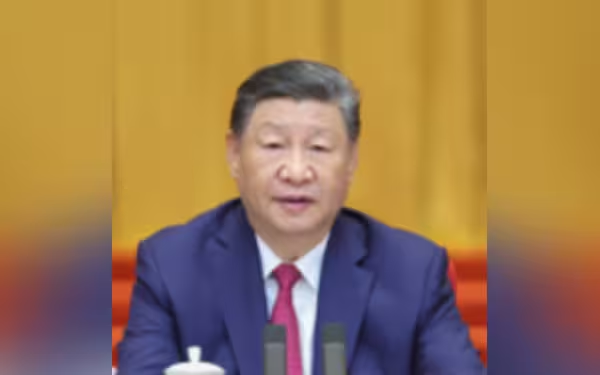Saturday, November 16, 2024 05:48 PM
Xi Jinping Chairs CPC Meeting to Address Economic Strategies
- CPC emphasizes stability while pursuing economic growth.
- New treasury bonds and interest rate cuts proposed.
- Focus on supporting middle- and low-income groups.
 Image Credits: pakistantoday
Image Credits: pakistantodayXi Jinping leads CPC meeting to strategize on China's economic stability and growth, focusing on treasury bonds and support for low-income groups.
In a significant meeting held on Thursday, the Communist Party of China (CPC) Central Committee’s Political Bureau gathered to discuss the current state of the Chinese economy and to strategize future economic initiatives. This meeting, chaired by Xi Jinping, the general secretary of the CPC Central Committee, comes at a time when the Chinese economy has shown generally stable performance throughout the year. The discussions highlighted the importance of making progress while ensuring stability, a crucial balance for any thriving economy.
During the meeting, it was agreed that new quality productive forces have been steadily developing, and substantial efforts have been made to secure the livelihood of the people. Additionally, positive strides have been taken to prevent and manage risks in major economic areas. The attendees noted that the fundamentals of the Chinese economy remain strong, supported by a vast market, robust economic resilience, and significant potential for growth.
The meeting emphasized the need for a comprehensive and objective view of the current economic landscape. It called for facing challenges head-on while maintaining confidence in the economy's future. To achieve this, the CPC stressed the importance of effectively implementing existing policies and rolling out new, targeted measures to meet the economic and social development goals set for the year.
One of the key points discussed was the issuance and effective utilization of ultra-long special treasury bonds and local government special-purpose bonds. These financial instruments are expected to enhance the role of government investment in stimulating economic growth. Furthermore, the meeting underscored the necessity of lowering the reserve requirement ratio and implementing impactful interest rate cuts to invigorate the economy.
Stabilizing the property market was another critical focus. The CPC plans to adjust housing purchase restrictions, lower interest rates on existing mortgage loans, and improve various policies related to land, fiscal matters, and finance. These measures aim to reverse the current downturn in the property market and establish a new model for real estate development.
Moreover, the meeting called for boosting the capital market by guiding medium- and long-term funds into it and removing barriers for social security, insurance, and wealth management funds. Support for mergers, acquisitions, and restructuring of listed firms was also highlighted, along with a commitment to protect small and medium-sized investors.
In a broader context, the meeting recognized the importance of fostering a favorable environment for the private economy and enhancing the incomes of middle- and low-income groups. This includes improving the consumption structure and supporting the development of industries related to elderly care and childcare. The CPC also aims to refine pro-childbirth policies to encourage population growth.
Employment support was another significant topic, with a focus on key groups such as fresh college graduates and rural migrant workers. The meeting stressed the need for increased assistance for individuals facing job security challenges, including the elderly and people with disabilities.
The CPC's meeting reflects a proactive approach to addressing economic challenges and fostering growth in China. By implementing targeted policies and supporting various sectors, the government aims to create a more resilient economy that benefits all citizens. As the world watches, the effectiveness of these strategies will be crucial in determining the future trajectory of China's economic landscape.













